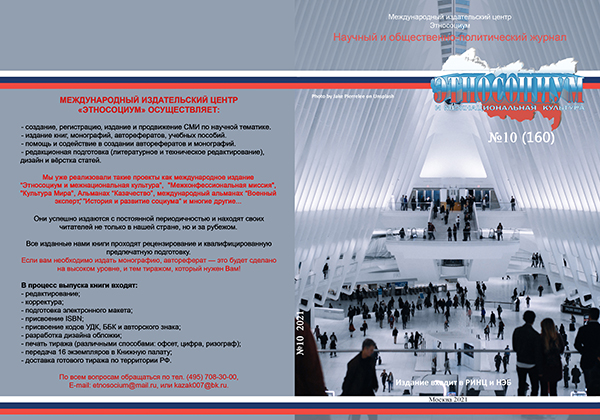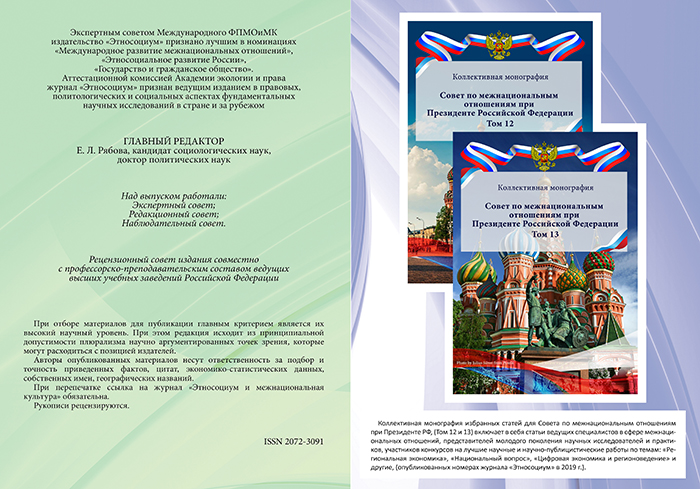

Content
|
COUNCIL OF INTERNATIONAL RELATIONSHIP
|
|
|
Kovalenko A.A. Culture as a key element of the "soft power" of the Russian Federation
|
9
|
|
Larina E.D., Nikonov S.B., Oleinikov S.V., Mani Momeni The manifestation of digitalization and globalization on the example of the political system of the Russian Federation
|
13
|
|
Galaganova S.G. Social and cultural dimension of digital transformation
|
27
|
|
ACTUAL PROBLEMS OF MODERN SOCIETY
|
|
|
Lezina O.V., Ternovaya L.O. Knowledge management in the context of human resource management
|
35
|
|
Bazhan T.A. Prospects of social and cultural adaptation of labor migrants as a means of an economic health
|
43
|
|
Daaev A.N., Ternovaya L.O. Sports and animals: ethical, cultural and legal aspects
|
53
|
|
REGIONAL STUDY
|
|
|
Kushchenko E.S., Merezhko N.E., Kharkovskaya E.V., Beletskaya E.A. Modern trends in health and health tourism
|
62
|
|
Fadeev P.V. Historical memory of the Kanzhal battle in the Kabardino-Balkar Republic (interethnic aspect)
|
71
|
|
INTERNATIONAL RELATIONSHIPS
|
|
|
Nwalie G.A., Egesi B.C. Nigeria-Russia relations: a comparative critical review
|
81
|
|
Karpacheva O.V. Tunisia: Internal Security Policy and countering violent extremism
|
87
|
|
Podolsky V.A. Social policy in China
|
98
|
|
Abstracts
|
106
|
|
Authors
|
117
|
|
Requirements to materials submitted to the international publishing house "Etnosocium"
|
121
|
The purpose of the article is to consider culture as a key resource of the "soft power" of the Russian Federation in the modern international system. The research methodology was formed by a set of approaches of neorealism and neoliberalism, which provided an opportunity to consider “soft power” and its cultural component as an important resource of the state, necessary to represent its national interests in the international arena. The article presents the definition of "soft power" and demonstrates that culture is one of its basic components. Cultural components find a special place in the Foreign Policy Concept of Russia, as well as in the practice of spreading the "soft power" of the Russian Federation, focused on the "non-force" strengthening of its positions in the international arena.
Keywords: culture, "soft power", foreign policy, international system, strategy, Russian Federation.
In this article, we address the problem of the manifestation of digital and global processes in the field of politics. It is necessary to show the contradictory nature of these phenomena, to analyze their positive and negative consequences. Highlighting the positive and negative effects of the influence of globalization and digitalization on politics, by analyzing the works of A.P. Tsygankov, P. Gemavat, A.E. Konkov and other authors analyzed in this article. The comparative method helped to prove that globalization and digitalization are the sources of political progress. The state understands the importance of developing new innovative technologies, but at the same time it also emphasizes that it is important to observe moderation in this matter. For example, a project to translate all lectures into online format was rejected, as this seemingly positive innovation is followed by a number of problems.
Keywords: digitalization, globalization, politics, political sphere, politics of the Russian Federation, political processes, political system of the Russian Federation.
The digital transformation of society is analyzed as accommodating potential threats for human beings and humanity. The author insists on complex and detailed research of digital phenomenon aimed at investigation of possible social and cultural risks.
Keywords: digitalization, digital transformation, digital economy, digital society, digital split, Big Data, digital security.
The article is the result of reflections on the problems of the training course "Human Resource Management in the Conditions of Change", read for students of the Master's program in the direction of "Human Resource Management" at the Moscow Automobile and Road Construction State Technical University (MADI). The article analyzes the most important link in modern organizational changes affecting human resource management. The central link in these organizational transformations is the acquisition of new knowledge, without which no organization can develop and be competitive. However, the culture of knowledge itself is a complex complex of not only ordered scientific information about objects and phenomena, but also contains relics of pre-scientific and extra-scientific knowledge. They can act as both a stimulus for the acquisition of new knowledge and an obstacle to professional training. Understanding the peculiarities of the structure of modern knowledge, the presence in it of elements related to the knowledge systems of past eras, allows us to use the culture of knowledge as an effective tool for organizational change that contributes to improving human resource management and increasing the personal efficiency of individual employees.
Keywords: knowledge, knowledge culture, knowledge management, human resources, organization, organizational culture, economics, symbol.
The purpose of the article is to study the potential of the system of socio-cultural adaptation and integration of migrants to counter illegal migration and shadow processes in the economy. The most important characteristics of foreign workers in demand in non-transparent sectors of the Russian economy are analyzed (low qualifications, motivation to stay and work outside the legal field, unsatisfactory command of the Russian language, lack of adaptation to Russian society, a tendency to a closed enclave existence, high cohesion). It is established that the state's efforts to "whitewash" the economy and optimize migration policy should be complemented by a system of adaptation and integration. Such a system will be able not only to fulfill its humanitarian mission of conflict-free entry of migrants into Russian society, but also to increase the effectiveness of monitoring the stay of foreigners in the country, to differentially approach different categories of migrants, to take into account the real need of the economy for foreign labor resources. Proposals have been formulated to implement the above in the article.
Keywords: social and cultural adaptation of migrants, social and cultural integration of migrants, migration policy, state policy in the field of integration, shadow economy, labor migration, illegal migration.
The article raises a problem that is urgent for the modern world, both from the point of view of sports and sports law, and from the position of animal protection. Examples of the use of various animals in sports are considered. Not only cultural, but also social origins of this practice are noted. The tendencies of the gradual humanization of the treatment of animals during sports competitions are shown.
Keywords: sport, nature, animals, ethics, politics, law.
Health tourism can rightfully be called the most important type of tourism, since it is a kind of contribution to the future, to the formation of a healthy nation that is able to positively perceive the surrounding reality, flourish and benefit society. Almost every locality has resources for the implementation of health-improving tourism, however, for its intensive development, a combination of therapeutic and preventive factors is needed.
Keywords: tourism, health improvement, recreation, therapeutic factor, climatotherapy, balneology, wellness, fitness, floating, mud therapy, reflexology, physiotherapy, health.
The article is devoted to the study of the historical memory of the inhabitants of Kabardino-Balkaria on the example of one of the most discussed events in the republican community in recent years - the Battle of Kanzhal. The author comes to the conclusion that the generalized representation of the "unified position" of the ethnic group about the battle is not true - the attitude to the battle from both Kabardians and Balkars is ambiguous. The article notes a relatively low proportion of people showing interest or having knowledge about the battle, and the "instrumental" nature of the event itself. "Memory wars" are waged by the most active, interested ethnic activists - on Internet forums, under thematic videos, etc., as well as scientists - in their books and articles. The attitude to a particular historical event even within an ethnic community differs depending on the level of education, financial situation, the severity of Russian identity and other factors.
Keywords: Kanzhal battle, historical memory, history, past, Kabardians, Balkars, Russia, republic, ethnicity.
Nigeria’s first major diplomatic cooperation with the Soviet Union began with military cooperation during the Nigerian Civil war many decades ago. Since then, the relationship between both countries has grown in leaps and bounds, but it has remained relatively modest when compared with those of other countries. This article provides an analysis of the relationship between both countries from the viewpoints of the two leading theories of international relations, neorealism and constructivism. While many scholars often classify Russia’s intentions as neorealist, we argue that it is the constructivist approach which offers the best explanation of Russia’s relationship with Nigeria.
Keywords: Russia, Nigeria, Diplomacy, International relations, education, neorealism, constructivism, Africa.
The article offers an analysis of the security sector reform in Tunisia. The main attention is focused on the Tunisian Internal Security Program, which is considered as a quite effective form of police activity in a transitional period with numerous unresolved problems of internal security.
The study of the causes of instability in the country reveals the lack of key infrastructure necessary to close the distance between the population and the police, and shows the inadequacy of responses to lots of threats, since the number of supporters of Islamic radicalism is currently growing. The article shows that a de-radicalization program can be an effective response mechanism that strengthens the police's fight against terrorism at the local level and measures to counter extremism in general.
Keywords: providing internal security, maintaining public order, police reform, deradicalization.
China created the system of social support twice: first time in the 1950-s, using the Soviet example, and second time – from 1990-s to present time, following the European example. The Western welfare state is well-known both in Russia and other countries, while the social policy of China started to attract attention of researchers just recently. The aim of the present article is to present the history of development of the social policy in China. The paper is based on statistical data, analysis of institutions and comparative and historic approach. It describes the growth of the support measures in China, their characteristics and scale. China has implemented the most important programs of social support: provision of pensions, medical insurance, universal education, but availability and extent of the supportive measures differs greatly depending on the region and profession of the receiver. The collected information on the social policy in China are important for studies on social insurance and provision of pensions.
Keywords: history of China, social policy, pensions, social insurance, welfare state.